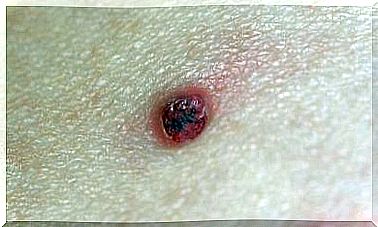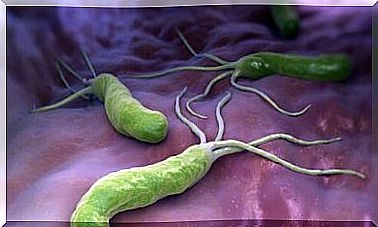Why Is My Nose Bleeding? Top 10 Causes
There is only cause for concern when your nose bleeds very heavily and frequently. In other cases, it is generally due to a trivial cause and the situation can be handled at home.

In the vast majority of cases, your nose bleeds for reasons that have nothing to do with a serious health condition. However, this is not a symptom to be taken lightly either. When it is repetitive or intense, it can be related to a serious problem.
It is a symptom that practically all of us have experienced at some point in our lives. So much so, that when the nose bleeds, almost everyone knows of some homemade measure to treat that hemorrhage.
Either way, it is always important to know the reasons why your nose is bleeding. Most of them are banal and need not cause any concern. The technical name for this type of hemorrhage is “epistaxis” and they only merit a medical consultation when they are recurrent.
What happens when the nose bleeds?
It is estimated that at least 60% of the population have experienced, at least once in their life, a nosebleed. There are many blood vessels in the nasal cavity and most of them are relatively superficial. About 95% of bleeding occurs in the area near the nostrils and is called anterior epistaxis.
When the bleeding originates from the deepest part of the nose it is called posterior epistaxis . The usual thing is that in these cases there is a greater volume of blood and it is more difficult to handle. When this type of bleeding occurs, it requires immediate medical attention.
Nosebleeds are most common among children under 10 and adults over 45. However, this problem can occur at any age. The main reasons for this to occur are as follows.

1. Dryness
Many times the nose bleeds because there is not enough moisture in the nasal cavity. This leads to dryness and makes bleeding to occur easily. The problem originates from not breathing through the nose, not keeping it clean, due to viruses or allergies. It is not serious.
2. Foreign body
It is relatively common for children to put objects up their noses and this goes unnoticed. Over the days, there may be bleeding that is usually accompanied by a purulent discharge, a bad smell, and shortness of breath. The best thing is that the case is attended by trained personnel.
3. Allergic rhinitis
Allergic rhinitis is not always accompanied by a nosebleed, but on many occasions this symptom is present. This bleeding is spontaneous and usually occurs at night. It is not a worrying sign, but the case should be put in the hands of a specialist to control the allergy.
4. Injury
Injuries are the most common reason for a nosebleed. They occur when suffering a blow, picking the nose or blowing with excessive force. In those cases, homemade measures are usually enough to stop the bleeding. More serious blows to the nasal cavity, or the skull, also cause bleeding and this requires a doctor’s intervention.
5. Hypertension
Until recently it was believed that hypertension could cause mild and relatively frequent nosebleeds. Today, it is believed that rather the opposite is true: nosebleeds create some anxiety and cause blood pressure to rise.
6. Inappropriate environment
Sometimes the environment is too dry, mainly due to the heating or air conditioning. This leads to drying of the nasal mucosa and causes any small lesions to lead to bleeding. It is approached with homemade measures.

7. Use of some substances
Some substances make people more prone to nosebleeds. Anticoagulants and antiplatelet drugs are some of those substances. Likewise, the excessive use of decongestants makes it easier to bleed.
8. Von Willebrand disease
Von Willebrand disease is a serious condition, which has some similarities to hemophilia. It is a genetic problem that causes clotting difficulties. Frequent and copious nosebleeds can be a symptom of the presence of this condition.
9. Other diseases
There are other serious diseases for which the nose bleeds profusely and frequently. These include leukemia, some malignant tumors, and certain liver diseases. When the bleeding has the characteristics mentioned, it is always necessary to consult the doctor.
10. Other causes
Sometimes a benign tumor puts pressure on the blood vessels that supply the nose and causes bleeding. Likewise, changes in atmospheric pressure or altitude can cause bleeding. This occurs when traveling by plane or climbing a very high mountain.
In short, as we have mentioned, most of the times when the nose bleeds there is no cause for concern. However, it is important to discuss it with your doctor, especially if it becomes recurring.









